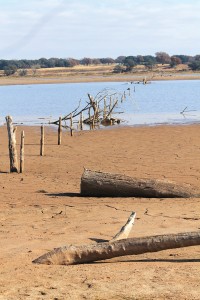The Brazos and other river authorities sell water, at high rates, to oil and gas companies and to water haulers that service the drilling industry.
“It’s always been a small portion of our customer base,” said Phillips. “Part of it is because it costs those companies a lot more to use our water. Groundwater is cheaper. Cost-wise, it just doesn’t make sense to use surface water.”
Surface water — or groundwater — sold to drillers carries a particularly high environmental price, however, especially in a state dealing with record-setting drought and looking at more of the same, due to climate change.

That’s because, unlike water used by other customers, much of the water sold to drillers never goes back into the long-term cycle of being returned to the river, flowing to the ocean, evaporating, and returning as rain.
The billions of gallons of water used to “frack” oil and gas wells become heavily polluted, including with potent carcinogens. Some is recycled, in the sense that the industry reuses it. But toxic drilling wastewater isn’t supposed to go back into the Brazos or any other river. Most of it is disposed of in injection wells that shoot the water deep into the earth, supposedly into stable formations from which it cannot leak.
Watchdog organizations estimate that in 2012 alone, oil and gas companies across the country took 280 billion gallons of contaminated water out of circulation, injecting it back into the ground. Drilling critics say injection wells do leak, as do gas wells, and that portions of aquifers in many states have been poisoned as a result, including some in Texas.
The Brazos River Authority once regulated Lake Alan Henry, located on the Brazos near Lubbock. It provided fresh water not only to the city of Lubbock but also to Citation Oil. But in 2005 Lubbock took control of the lake, and when the oil company’s contract expired in 2012, the city declined to renew it. After Lubbock’s decision, local residents expressed their agreement on a local newspaper’s website. “No matter how much you believe in oil drilling (and I certainly do!) you don’t make drilling mud out of it at a time when we can’t even water our grass,” one commenter said.
“Don’t mess with our drinking water” said another post.
With the historic drought affecting reservoirs across the state, and cities and water districts looking for new sources, more and more water-selling entities are making that same decision. But the Brazos authority isn’t considering that option, at least for now.
The result is that drillers are turning more and more to groundwater, competing with farmers and residential well-water users in many areas for resources that are shrinking.
Chip Minty, media relations chief at Devon Energy, said that even though many towns around Fort Worth have stopped selling water to drillers, Devon can use groundwater from land leased for that purpose or from land it owns, as well as other surface-water sources. Devon also has a water-recycling program.
No one knows exactly how much groundwater oil and gas companies are using — no government body regulates it.
The Upper Trinity Groundwater Conservation District tried to limit well-water use by drillers in their four-county district north of Fort Worth, but the district didn’t have the enforcement power to make oil and gas companies comply.
“Drillers would get their water from wherever they wanted,” said Sharon Wilson, an oil-and-gas activist known online as Texas Sharon, who runs Bluedaze, a website dedicated to informing people about the dangers associated with hydraulic fracturing. “They don’t have to follow the rules.”
The Texas Water Development Board estimates that in 2010, oil and gas companies in Dallas, Denton, Hood, Montague, and Tarrant counties accounted for less than 11 percent of groundwater usage from the Trinity Aquifer. But in Montague County, according to the Bowie News, such companies used 91 percent of the water that year.
Water is becoming a valuable commodity, as experts have been predicting for years. Many residents in Montague County told Fort Worth Weekly that they have turned to “farming” water — that is, leasing water-well rights — because it’s becoming more profitable than running cattle.
********











